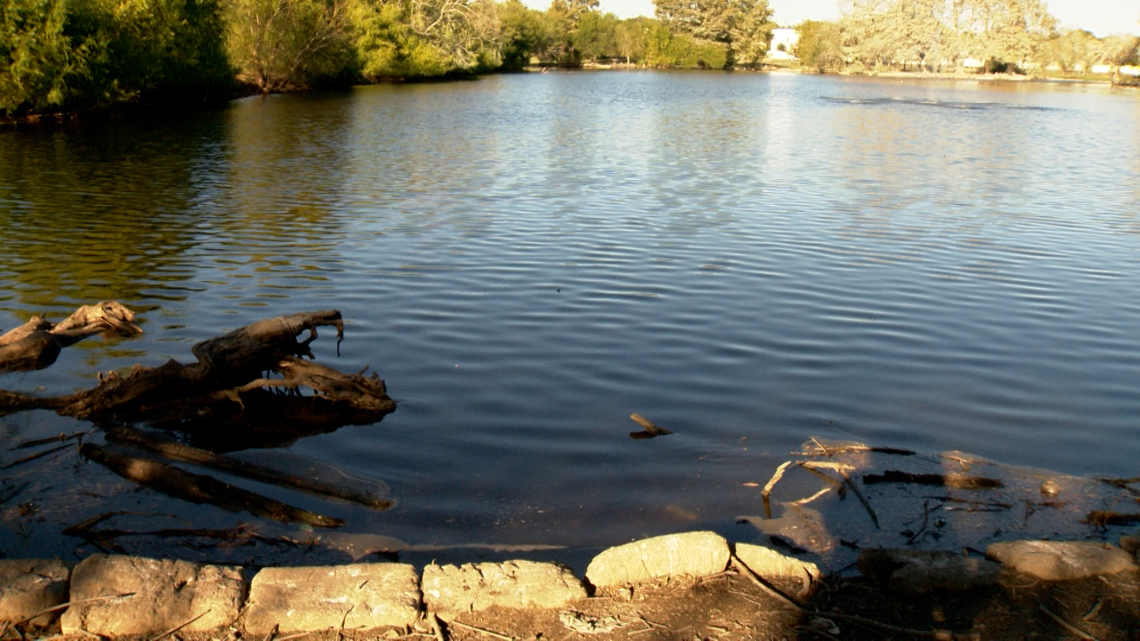
Neighbors near Northern Hills Lake report an alarming ecological crisis involving dying wildlife and deteriorating conditions, prompting a state investigation.
SAN ANTONIO — Residents living near a private lake on the northeast side say they’re witnessing an ecological collapse: dead fish, dying ducks and geese, trees losing their leaves and a smell so strong they can’t open their windows.
The unfolding die-off is happening at Northern Hills Lake, a privately managed lake near Thousand Oaks, overseen by Acadia on the Lake Apartments management. Several residents tell KENS 5 the situation began in late spring and early summer, and has grown steadily worse.
Greg Harman has lived in the community for 12 years, and said the lake was the main draw for nearly everyone who moved to the area.
“To have this right outside your back door to just go for a walk,” Harman explained. “Many of us have adopted ducks and geese and basically raised them where they would come to us like pets.”
But from late spring to early summer, he said, everything changed.
Harman says the first shift happened when large numbers of white egrets arrived at the lake.
“We had an influx of the white egrets… and they were subsequently dispatched by a large number of the cormorant birds who came in and just covered everything in their droppings — including the lake,” he said.
He believes the cormorants wiped out the smaller fish, ate ducklings and contributed to the worsening water quality.
Residents told KENS 5 several trees around the lake now appear to be dying as well.
By late fall, Harman said the situation became undeniable.
“We had a big fish kill… it started with all of our large carp floating to the top. Then eventually we started seeing smaller bass and perch. All of the fish seemed to be dying,” he said.
Soon, the ducks began dying too.
“We started noticing that our ducks were also dying… a slow, painful death,” Harman said. “We couldn’t believe it.”
Multiple breeds are affected, including Muscovy ducks and Egyptian geese, residents said.
“To no avail, they’ve all died. Even today we found more dead ducks,” Harman said.
Several neighbors told KENS 5 off-camera that they even tried taking in a sick duck to see if it could be saved, but the birds did not survive.
Residents say they repeatedly asked property management for answers but received none. Harman said concerns were dismissed until a Texas game warden responded to the lake.
The game warden, he said, collected six dead ducks for testing.
“One representative from Fish and Game told us not to handle any more of the dead or dying ducks because they don’t know what they have — and it could be communicable,” Harman said.
When KENS 5 went to the lake Wednesday to speak with more residents, staff with Acadia on the Lake asked the news crew to leave. An office employee said corporate had “no comment” on the situation.
In a statement, the Texas Parks and Wildlife Department (TPWD) confirmed it is investigating.
“Texas Parks and Wildlife Department is aware of the fish and duck mortalities at Northern Hills Lake and is currently conducting an investigation,” the agency said. “TPWD does not believe the incident is related to an influx of cormorants.”
Texas Parks and Wildlife officials say residents do not need to avoid the area around Northern Hills Lake, but they should take precautions. The agency urges people not to handle any sick or dead wildlife, and to avoid feeding animals or doing anything that would cause wildlife to gather in large numbers. Pets should also be kept away from carcasses and should be up to date on vaccinations, especially if they regularly walk near the lake.
TPWD says its wildlife mortality investigation is still underway. These investigations typically involve identifying which species are affected, documenting symptoms in any sick animals and analyzing samples through laboratory testing. How long that process takes depends on the type of event and how quickly lab results come back.
The worsening conditions have changed daily life for families living along the water.
“We used to have a tradition after Thanksgiving — take a walk around the lake and walk off some pumpkin pie,” Harman said. “But we will not be doing that this year… the smell and the view are terrible. It looks like we’ve woken up to an apocalyptic event under these trees.”
Harman said he still hasn’t received answers about the fish kill.
“I haven’t heard anything about the fish, why those may still be dying,” he said.
The sight of children playing near the lake now troubles him.
“It’s very disconcerting to see families with little kids out trying to play with what used to be a lake full of ducks… and now it’s a lake full of buzzards picking over the carcasses,” he said.
To him, the scope of the die-off feels bigger than one cause.
“It seems like some kind of an ecological event,” Harman said. “The trees are dying, the water seems polluted, and the ducks and fish are dying off. That’s four supposedly unrelated things happening. That seems a little too coincidental for me.”
While residents blame cormorants for eating ducklings and stripping small fish from the lake, the birds are protected under the federal Migratory Bird Treaty Act. Disturbing their nests or eggs is illegal without a federal permit.
KENS 5 emailed Acadia on the Lake’s management company asking about water quality, cleanup efforts and resident concerns. We’ll publish an update as soon as we hear back.
Officials also encourage the public to report any additional sick or dead wildlife found outside the immediate lake area. Those sightings can be reported directly to a local TPWD biologist, whose contact information is available at tpwd.texas.gov/biologist.
